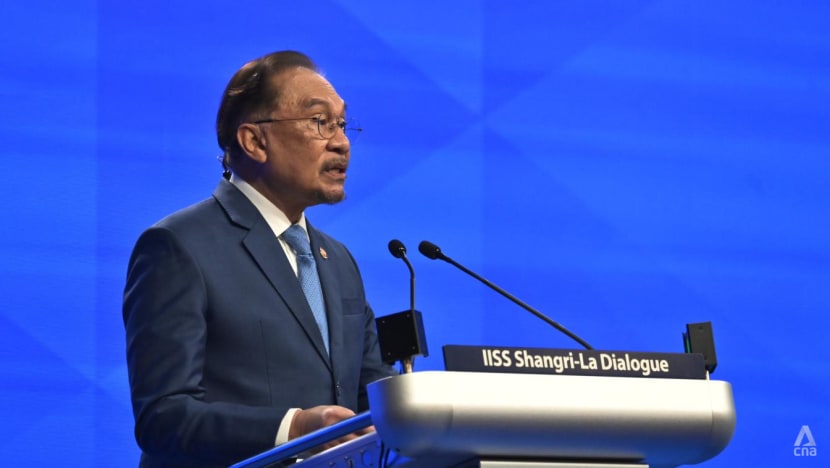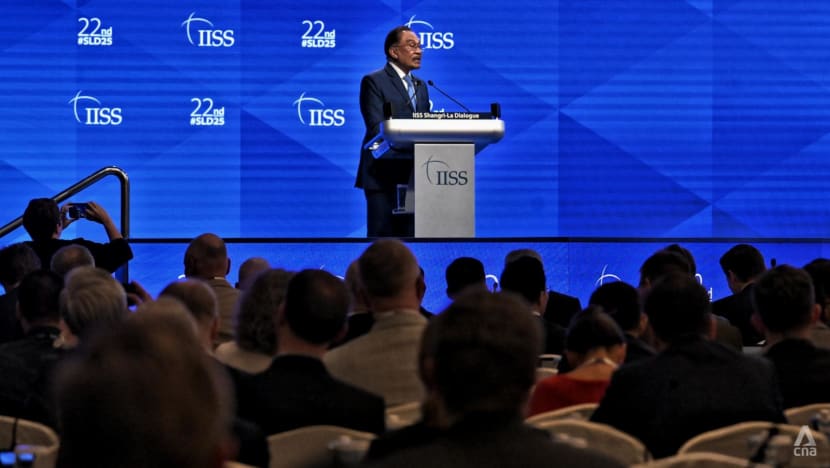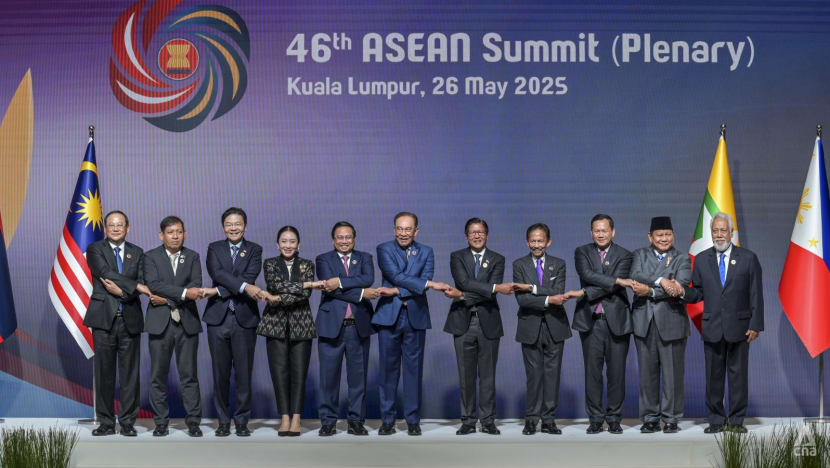Trade 'critical' to ASEAN, must be protected from 'arbitrary' curbs: Anwar at Shangri-La Dialogue
In a 15-minute special address at the Shangri-la Dialogue, Malaysia Prime Minister Anwar Ibrahim stressed that faltering trade could have a rippling impact on stability.

Malaysia Prime Minister Anwar Ibrahim gives a special address at the IISS Shangri-la Dialogue 2025 in Singapore. (Photo: CNA/Wallace Woon)

This audio is generated by an AI tool.
SINGAPORE: Trade is part of Southeast Asia’s strategic architecture and must be protected “from the onslaught of arbitrary imposition of trade restrictions”, said Malaysian Prime Minister Anwar Ibrahim in a special address at this year’s Shangri-La Dialogue on Saturday (May 31).
He added that the Southeast Asia region is “holding its ground” in a troubled world, cautioning that trade faltering could have rippling consequences on stability, with impact cascading beyond any one region.
“In Southeast Asia, we have learned that lasting stability begins with steady fundamentals, clear policies and a long view. Trade is not a soft power indulgence. It is part of our strategic architecture,” said Anwar who is this year’s rotating chairman of the Association of Southeast Asian Nations (ASEAN).
“And like any critical system, it must be protected, not from competition, but from the onslaught of arbitrary imposition of trade restrictions,” he added in his 15-minute speech.
“What holds true for us holds true elsewhere - where trade flourishes, stability follows. When it falters, the consequences ripple far beyond any one region,” said Anwar to an audience of defence ministers, military chiefs, and senior officials from nearly 50 countries gathered for the three-day security summit.
While he did not specify countries, the Malaysian premier was referencing the ongoing trade war between US and China, which recently made global headlines following US President’s Donald Trump sweeping “Liberation Day” tariffs that caused turmoil in the stock market and sparked economic uncertainty across industries.
ASEAN nations are among those most heavily hit by US tariffs, with countries such as Cambodia and Laos slapped with 49 per cent and 48 per cent import tariffs respectively, before Trump announced on Apr 9 a 90-day pause on “reciprocal” tariffs on imports from almost 60 countries and the European Union.
On May 12, both the US and China agreed to temporarily cut massive tariffs imposed on each other’s goods.
Washington cut tariffs on imports from China to 30 per cent from 145 per cent for 90 days, while Beijing will slash duties on US imports to 10 per cent from 125 per cent for the same period.
As both countries continue to negotiate, countries across the world continue to be gripped by uncertainty.
During the ASEAN Summit earlier this week, Anwar said that the bloc has the “fortitude and staying power” to “weather the storms” of economic uncertainty swirling in the region, arising from geopolitical trade tensions between the US and China.

In his speech on Saturday, Anwar said that at the summit, ASEAN leaders affirmed the bloc’s commitment to an open, predictable and rules-based trading system.
“Not because it is expedient, but because it is existential,” he said, noting that ASEAN members have open, export-driven economies deeply connected to global markets.
Amid global uncertainties, “Southeast Asia is holding its ground – through cooperation, collective resilience, and the steady exercise of our own agency”, he added.
He cited how ASEAN is widening its “strategic aperture” by working with other regions such as the Gulf and using “new tools” such the formation of the ASEAN Geoeconomics Take Force to help the bloc “navigate external shocks with sharper coordination and foresight”.
“And the more we act together, the harder it becomes to be pulled apart by external gravity. Preserving our autonomy is not about resisting others. It is about strengthening ourselves. This, in essence, is what ASEAN centrality is about,” he added.
On where Malaysia stands when it comes to the US-China power tussle, Anwar said that his country does not believe in any sphere of influence.
This is because history has shown that when major powers try to divide the world into exclusive zones of control, “smaller nations are often left voiceless”.
“Stability does not come from carving up the map, but from creating space for all to participate meaningfully in shaping the order we live in,” he said.
Malaysia therefore takes an “active non-alignment” approach to preserve its ability to act on its terms.
“It is a deliberate way to remain outward facing, connected and in control of our strategic base.”
SOUTH CHINA SEA TALKS THROUGH QUIET BUT FIRM DIPLOMACY
In his speech, Anwar stressed that all the emphasis about trade does not mean that ASEAN was oblivious to the hard security challenges facing its region.
One such challenge is the dispute between Beijing and some ASEAN member states on maritime claims in the South China Sea.
Anwar stressed that the objectives of ASEAN states in this matter is not achieved through escalation – nor by provoking others into disproportionate responses.
“It is best pursued through steady, principled diplomacy: Quiet, where necessary, but always firm,” said Anwar.
China claims almost the entire South China Sea, despite overlapping claims by Brunei, Malaysia, the Philippines and Vietnam.
A 2016 ruling of an international arbitral tribunal said Beijing's claims, based on its historic maps, have no basis under international law, a decision China does not recognise.
Tensions in the South China Sea have escalated recently, especially between Beijing and Manila.
Philippines President Ferdinand Marcos Jr on Monday called on the bloc to accelerate the adoption of a legally binding code of conduct in the South China Sea, ABS-CBN news reported.
Negotiations on the code of conduct have been ongoing since the early 2000s as a way to manage tensions in the South China Sea, but progress has been slow.
As ASEAN chair, Malaysia is seen to be key in the bloc’s collective negotiations with China on the maritime territorial disputes.
Speaking on Saturday, Anwar stressed that Malaysia remains deeply concerned about “the potential for escalation among the claimants in the South China Sea”.
“We have no interest in seeing tensions spiral into confrontation – least of all in waters so critical to our own security and prosperity.
“We will urge restraint, encourage dialogue, and work to preserve the stability on which this region depends. Above all, we remain steadfast in our principled insistence that all parties uphold the United Nations Convention on the Law of the Sea,” he added.

In response to questions from forum delegates, Anwar added that strained ties between the Philippines and China may have been “exaggerated” and that he has seen engagement between leaders from both sides.
“We support that position, engagement must be more constant and dynamic to refrain from escalation,” said Anwar.
ON MYANMAR, GAZA AND MALAYSIA'S STRATEGIC POSTURE
On the conflict in Myanmar, Anwar said that while the situation remained “grave”, ASEAN “was not standing still” and is keen to engineer positive outcomes.
“But we are equally clear that the Five-Point Consensus dictates that a resolution that excludes those most affected by this crisis will not endure. Myanmar’s nationhood must be forged through inclusion, not erasure,” he said.
The five points, agreed during a meeting between ASEAN leaders in April 2021, include the immediate cessation of violence and the commencement of constructive dialogue among all parties.
In a 15-minute question and answer segment, Anwar stressed that these conditions were key for peace and to this end, he said that Malaysia has “taken initiative” to invite some groups for dialogue in Kuala Lumpur in April.
Myanmar has been in turmoil since its military overthrew an elected civilian government and triggered pro-democracy protests in early 2021 that morphed into a widening rebellion and conflict.
More than 6,600 people have been killed since the coup, according to the Assistance Association for Political Prisoners, and millions displaced.
Anwar also spoke briefly on the conflict in Gaza, warning how “selective outrage” can “dull moral clarity”.
“Indeed, the genocide in Gaza is a test of our collective conscience. The scale of devastation, the open defiance of humanitarian norms, and the paralysis of institutions meant to uphold them demand more than sympathy,” he said.
Israel has stepped up its military offensive in Gaza recently, with the campaign now extending beyond the 600-day milestone. The offensive is in retaliation for the Hamas-led attack on communities in southern Israel on Oct 7, 2023 that killed some 1,200 people and saw 251 hostages abducted into Gaza.
Israel’s assault has killed more than 54,000 Palestinians and reduced much of the crowded coastal enclave to rubble.
Anwar has been vocal for the Palestinian cause, and has on several occasions condemned Israel’s campaign as a “genocide”.
In his Saturday speech, he stressed that action on Gaza “demands consistency”.
“We do not object to like-minded partners talking amongst themselves. But coalitions that build walls instead of bridges, stoke arms competition, or undermine the legitimacy of multilateralism should give us pause,” said Anwar.
“A stable region is not one braced for conflict, but one grounded in openness, transparency, and habit-forming cooperation,” he added.
On Malaysia’s own foreign policy approach of non-alignment, Anwar said that it will engage all countries, “not to set one against the other, but to maximise our own strategic space”.
So while Malaysia welcomes a “strong and enduring US presence” in the region towards fostering peace, it also values its “vibrant and firm ties” with China and other countries in Asia, Europe and beyond.
“What Southeast Asia needs is a dynamic equilibrium that enables cooperation without coercion and a balance without bloc politics,” he said.
“For Malaysia, this is a deliberate and strategic posture to help preserve an open region, to assert our sovereignty and to make our own choices – on our own terms,” he said.


















